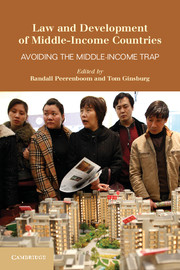Book contents
- Frontmatter
- Contents
- List of Contributors
- Acknowledgments
- 1 Law and Development in Middle-Income Countries
- Part I The Politics of Development in Middle-Income Countries
- Part II Middle-Income Countries in a Globalized Economy
- Part III Good Governance and the Rule of Law in Middle-Income Countries
- Part IV Socioeconomic Challenges in Middle-Income Countries
- Part V International Donor Strategies for Middle-Income Countries
- 15 The United Nations and Governance in Middle-Income Countries
- 16 Law and Development in Middle-Income Countries
- Appendix Selected Country Data as of 2011
- Index
- References
15 - The United Nations and Governance in Middle-Income Countries
A Vietnam Case Study
Published online by Cambridge University Press: 05 June 2014
- Frontmatter
- Contents
- List of Contributors
- Acknowledgments
- 1 Law and Development in Middle-Income Countries
- Part I The Politics of Development in Middle-Income Countries
- Part II Middle-Income Countries in a Globalized Economy
- Part III Good Governance and the Rule of Law in Middle-Income Countries
- Part IV Socioeconomic Challenges in Middle-Income Countries
- Part V International Donor Strategies for Middle-Income Countries
- 15 The United Nations and Governance in Middle-Income Countries
- 16 Law and Development in Middle-Income Countries
- Appendix Selected Country Data as of 2011
- Index
- References
Summary
THE UNITED NATIONS AND MIDDLE-INCOME COUNTRIES
For the United Nations, middle-income countries (MICs) matter as never before. The number of developing countries that are MICs has increased from sixty-eight in 1999 to 104 in 2011, representing about 75 percent of the world’s poor, so that addressing poverty reduction in MICs has become a high development priority.
It is also one for which the United Nations bears a special responsibility, because it is mandated to maintain an engagement with all developing countries (universality) even while allocating more aid toward the least-developed countries (progressivity). By contrast, bilateral aid donors traditionally phase out aid programming once a country “graduates” to MIC status. The need for the United Nations to remain engaged with MICs was highlighted for the first time in the 2008 Triennial Comprehensive Policy Review and has figured prominently on the United Nations’ agenda since then.
The main engine for the United Nations’ development cooperation since 2000, the Millennium Development Goals (MDGs), has proved a useful framework for the least developed countries (LDCs) and lower-income countries (LICs), but less relevant for MICs, many of which have achieved all or most of the MDGs. As the 2015 deadline for achieving theMDGs approaches, the United Nations and other development partners are increasingly focused on ensuring that the post-2015 framework addresses key development challenges, in particular rising levels of income inequality. Average country-level inequality increased 20 percent between 1992 and 2005, and this is particularly true of MICs, in which income inequality is greater than in either LICs or upper-income countries. This emphasizes the importance for the United Nations to focus on human development rather than merely economic develop- ment,10 and to do so in MICs where the poor are increasingly being left behind.
- Type
- Chapter
- Information
- Law and Development of Middle-Income CountriesAvoiding the Middle-Income Trap, pp. 309 - 334Publisher: Cambridge University PressPrint publication year: 2014
References
- 1
- Cited by



